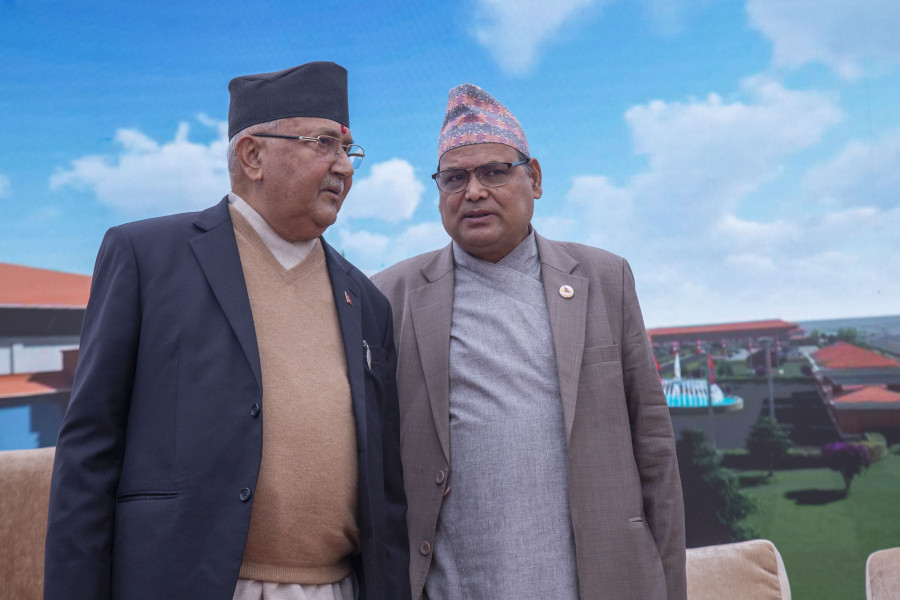Politics
Why the rape charges against Speaker is a litmus test for police, the ruling party and government
Although Krishna Bahadur Mahara has tendered his resignation, the government and ruling party have yet to take a concrete position while the police still haven’t pursued a criminal case.
Anil Giri
The rape allegation against House Speaker Krishna Bahadur Mahara by a woman who works at the Parliament Secretariat has become a litmus test for the state, the ruling Nepal Communist Party and the Nepal Police, with the public increasingly scrutinising all developments in relation to the case.
The government and ruling party have both yet to issue a clear statement on Mahara’s case, which has already sent shockwaves through political circles and the public. Mahara himself has resigned as Speaker until the “investigation is complete”.
But members of the primary opposition Nepali Congress and constitutional analysts say that Mahara cannot “suspend” himself and any resignation tendered is final.
“How can a resignation be conditional?” said senior advocate Bipin Adhikari. “Second, how can he suspend himself? There are a lot of legal loopholes in his resignation.”
A meeting of the party secretariat on Tuesday instructed Mahara to resign as Speaker and Member of Parliament, but so far, he has only resigned from the post of Speaker.
Two senior ruling party leaders told the Post that pressure is now mounting on the victim to not lodge a police complaint against Mahara.
The woman who accused Mahara on Monday evening via HamraKura.com has not yet filed a formal complaint and is already saying that after speaking with her relatives, she made a mistake accusing Mahara, according to ruling party leaders.
Questions have also been raised over the role of the Nepal Police, which failed to take Mahara into custody despite visiting the crime scene on Sunday evening and not ask the victim to lodge a formal complaint.
According to legal experts, until the plaintiff lodges a formal complaint, the police cannot arrest or take statements from the accused.
“This is a criminal case,” said Adhikari. “Until someone comes with a written complaint, the police cannot move ahead with the case.”
However, Adhikari said that the police should’ve encouraged the woman to file a case.
“Police can support the victim by writing the case on their behalf. But in this case, the police did not provide legal support to the victim, probably because the case was associated with a high-profile personality,” said Adhikari.
A senior Nepal Police officer reiterated Adhikari, saying that the woman dialed 100 and called the police to her room.
“Apart from that, we have not received any written complaints and until she files a case with the police in writing, it will be difficult for us to expedite the investigation,” he said.
A Nepal Police team has already collected prima facie evidence from the woman’s rented room in Kathmandu on Tuesday. The evidence includes an alcohol bottle and a glass that Mahara had allegedly drunk out of and Mahara’s glasses.
On Tuesday, police officials had asked the woman whether she would file a case against Mahara but she reportedly told the police that she would first discuss with her husband, who is currently out of town, and then make a decision, according to ruling party leaders.
Immediately after visiting the crime scene on Sunday evening, Nepal Police had informed Home Minister Ram Bahadur Thapa, Home Secretary Prem Kumar Rai and Inspector General Sarbendra Khanal about the case, according to the senior police officer. Thapa had then called on Khanal and instructed him to conduct a fair investigation into the case.
Police should be mindful that innocent people are not framed but those who have made mistakes should be brought under legal provisions, Thapa told Khanal, according to the police officer. Thapa further told Khanal not to tolerate any kind of political pressure from anyone in this case, the officer said.
The opposition Nepali Congress, meanwhile, is adamant that legal provisions should take the due course. Relations between the ruling and opposition parties have recently soured due to a recent attack against Nepali Congress leaders by cadres of the Nepal Communist Party.
“The law applies to all,” said Nepali Congress spokesperson Bishwo Prakash Sharma. “Ordinary citizens and Mahara must be treated equally. The onus lies on the ruling party, the government and the investigating agency to seriously pursue Mahara’s case. Otherwise, it will only lead to impunity.”




 8.79°C Kathmandu
8.79°C Kathmandu














